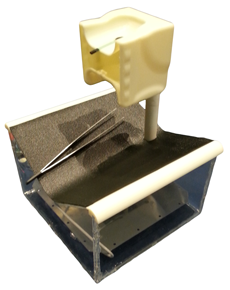Meet our innovator: Alexis Schilf
Hometown: Chicago
Major: biomedical engineering
Dream job? Start a designer shoe company that specializes in equally comfy and fashionable footwear
As the head of a startup, you’re the inventor, CEO, marketing and finance departments, all rolled into one. But that’s not a problem for Case Western Reserve University senior Alexis Schilf.
“I personally like balancing everything and making sure everything is on track—picking up where I’m needed,” she says. “Everything from designing the product to marketing it to selling it—in a startup, you have to do everything.”
The biomedical engineering major has always had business and design on the brain, she just never envisioned starting her own company as a college student. But when a summer project showed potential to turn into something bigger, she had to try.
Her company—SensID—grew out of her involvement in Case Western Reserve’s CREATE program—a summer design experience that matches budding engineering entrepreneurs with physicians, putting the teams to work on real problems in clinical settings.
Schilf joined CREATE the summer after her first year. Her team’s partner physician told them that perioperative nurses don’t get sufficient hands-on training before going into real operating rooms. So she and company co-founder Jacob Schwartz, a computer science and economics major, developed a physical simulator that mimics a surgeon’s hand, giving nurses the chance to practice passing instruments in a surgical setting before they step into the OR.
In surgery, it’s not just a matter of handing a scalpel over handle first. There are hundreds of surgical instruments, each with its own unique passing procedure: angled scissors are passed one way, straight-edged scissors another, and so on. Knowing all the details of these complex handoffs makes for a smoother, more efficient operation overall, which improves patient care and reduces the amount of time nurses have to be supervised during surgeries.
Schilf has been working with the perioperative nursing program at University Hospitals Case Medical Center and with nursing students at Case Western Reserve’s Frances Payne Bolton School of Nursing, getting feedback on the simulator. And they plan to start field testing it this summer in other hospitals across the region.SensID has earned strong showings in local business plan competitions. The company won third place in last year’s Spartan Challenge at Case Western Reserve, and was one of 20 national finalists to pitch their products at Blackstone LaunchPad Demo Day in New York City this year. The company also took second place in this year’s St. Gobain design competition at Case Western Reserve.
For Schilf, each competition has provided a wealth of experience and valuable lessons, in addition to valuable contacts. Her involvement with the campus entrepreneurship program Blackstone LaunchPad has put her in touch with Case Western Reserve alumni who have served as on-call mentors, ready to offer business-savvy advice on everything from financing to legal issues to what competitions to enter next.
“People do a double-take when they look at you as a student and know you have a company,” she says.
And through the university’s partnership with global design powerhouse Nottingham Spirk, Schilf has even been able to pick the brains of some of the best in the business.
“It’s incredible—there’s this cool, innovative company perched on the top of the hill overlooking campus, and we have this insider relationship with them,” she says.
To Schilf, those relationships are the coolest thing about being a student entrepreneur.
“People do a double-take when they look at you as a student and know you have a company,” she says. “But this project has taken me to different places and given me the opportunity to meet so many different people.”
As for the future of the company, Schilf can see her product making a difference in hospitals across the country—even in military applications and improving training in developing countries.
“I just want to see it make an impact,” she says.


